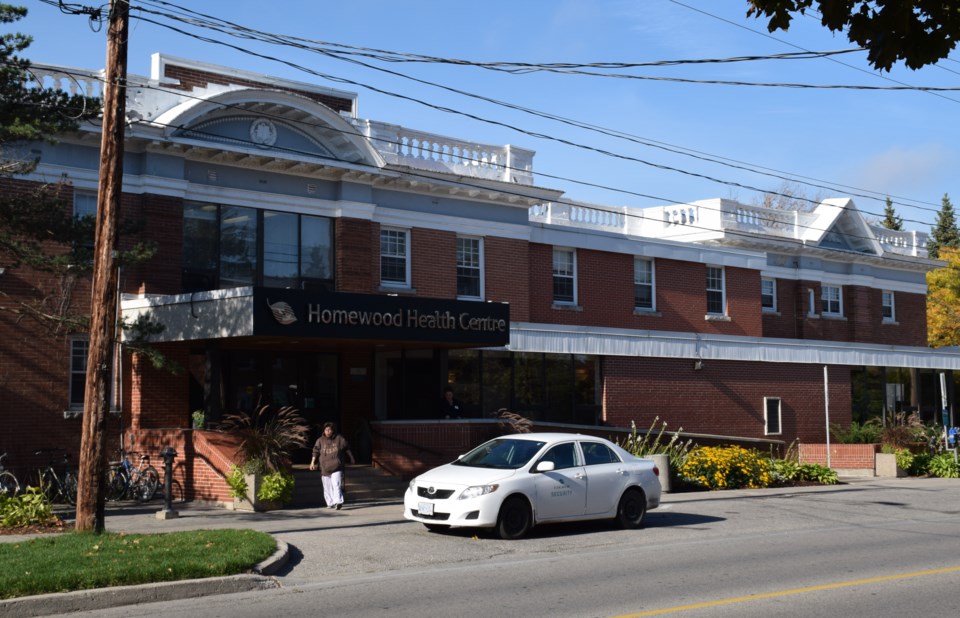Guelph-based Homewood Health Centre is at the centre of a British Columbia Human Rights Tribunal proceeding that could have national implications.
The case involves one man’s complaint about an overemphasis on the use of the Alcoholics Anonymous and the 12-step method in addiction treatment. The tribunal has agreed to hear the case.
Byron Wood, an out-of-work Vancouver nurse, spent five weeks in a residential treatment program at Homewood in the spring of 2014 to address substance abuse.
According to a news report in The Province, Wood experienced a psychotic episode in October, 2013, after suffering withdrawal symptoms from alcohol, prescription and street drugs. His employment as a mental health nurse ended sometime afterward.
In the article, Byron said he had taken time off work and was using drugs steadily during that time. He attempted to clean up in preparation for returning to his job and suffered a psychotic episode that appears to have been the impetus behind subsequent treatment for addiction.
He contends that he was forced into Alcoholics Anonymous and the 12-step program by his employer and union, against his atheistic beliefs. The Vancouver Coastal Health Authority, the British Columbia Nurses Union, and the College of Registered Nurses of B.C. all deny they were made aware of Wood's religious concerns prior to ordering his treatment.
In an interview with GuelphToday, Byron said that as an atheist he is against the emphasis on a high power or God in the methodology of both AA and the 12-step program. His atheistic beliefs, he said, were not respected during his involvement in the programs at Homewood.
An official with Homewood said the facility, which is known internationally, uses AA and the 12-steps, but that the programs are not necessarily God-centred.
Wood doesn’t see it that way, and he is pushing for an end to what he calls “religious coercion in addiction treatment facilities,” and hopes his case will lead to a broader range of program options in facilities.
Wood said most in-patient addiction centres in Ontario are private, for-profit operations, and most are based on the 12-steps program and AA.
“In Ontario, if you want treatment for an addiction problem, you have no choice but to go to a program based on the 12-steps of Alcoholics Anonymous,” he said by telephone this week.
But Wood neither believes in God, nor in submitting himself to a higher power, he said. He takes exception to being placed in such a program, and his having his professional certification reinstated should not be dependent on his continuing in AA.
In the United States, he added, courts have consistently ruled that AA and the 12-steps are based on religious principles. “And it is a violation of the First Amendment to mandate someone to the program if they object for religious reasons,” he said.
“My other concern is that there are a large number of other addiction treatments available that are secular, and research shows that they work,” he said. “There is absolutely no research that shows that AA and the 12-steps have any effectiveness at all.”
He said AA attempts to “indoctrinate you with religion,” and uses “bullying tactics.” He said one of the conditions placed upon his returning to work was that he stay in AA.
Wood said he filed a complaint with the BC Human Rights Tribunal for two main reasons.
“For my personal reasons, I would like to return to work as a nurse,” he said. “But as a bigger goal, I am hoping to set a precedent in Canada, because this hasn’t been ruled on in Canada. And people through the court system, are being mandated to AA and 12-steps by employers, professional colleges, and unions. They are all forcing people into religious programs that don’t have an evidence base to them.”
Dr. Harry Vedelago is an addiction physician and the chief of addiction medicine at Homewood Health Centre. He said he would not comment on a patient’s stay at the centre. But he defended AA as a successful treatment program, and said there is a distinction between it and 12-steps.
“There is a treatment called 12-step facilitation, and it has been shown to be a validated treatment modality,” Vedelago said. “Many places use that, in combination with cognitive behavioural therapy and motivational interviewing. That’s what we do here.”
He said the chances of maintaining sobriety are “greatly enhanced” if the person is involved in a self-help group.
“Traditionally, it has been Alcoholics Anonymous, and Cocaine Anonymous and Narcotics Anonymous,” he said. “Of course, this is what most treatment centres will say that people have to attend.”
But AA and the 12-step program, he added, are not religious organizations.
“Their concept of a higher power is something greater than you,” he continued. “It can be anything. The only requirement to go to any of these meetings is a desire to get clean and sober. Whether you believe in something or not, doesn’t really matter. They just say, have something that you can hold on to. It’s open to all faiths, or no faiths.”
The term “God” is used in AA, but it can mean any number of things, including Good Orderly Direction, or Go On Dreaming, Vedelago added.
Wood said he has “been doing well recently” in terms of his struggles with addiction, and found “secular programs” in the community to help him.
